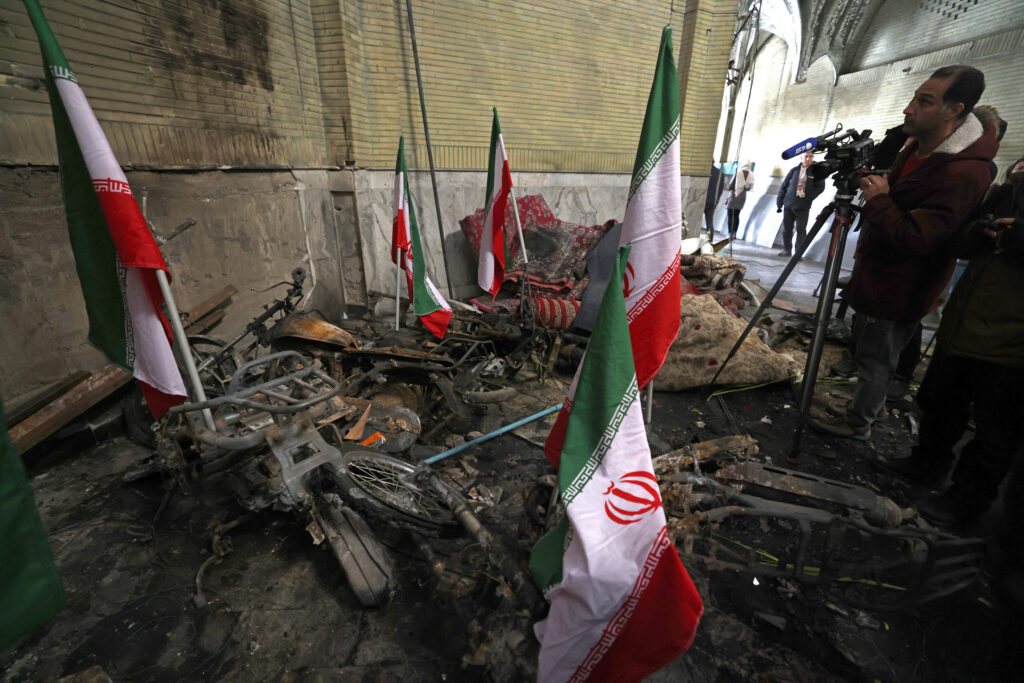By Nadine Abdalla
The Egyptian labor movement played a decisive role in bringing down the authoritarian regime. The mobilization of workers from 8 February 2011 served as a tipping point in the Egyptian uprising. Workers across many sectors went on strike, refusing to work until their rights were duly recognized. This dynamic left the economy paralyzed, along with the main state facilities, evolving into a scene of civil disobedience. With these protests increasing in number and spreading geographically, the political scene changed completely in favor of the revolution[1].
What is worth noting is that all of these labor protests displayed two important characteristics. Firstly, they emerged entirely separate from the Egyptian Trade Union Federation (ETUF), the official trade union federation co-opted by the state which always adopted the latter’s political positions. Secondly, in order to avoid repression, these labor protests have always refused to both establish any links with political organizations and the politicization of their claims.[2] Indeed, the uprising presented a political opportunity for the labor movement.. New trade unions subsequently emerged at lightning speed, along with new trade union federations such as the Egyptian Federation of Independent Trade Unions (EFITU)[3] and the Egyptian Democratic Labor Congress (EDLC).[4] Nevertheless, despite the downfall of Mubarak, the new trade unions’ leaders have remained on their guard, being careful not to show any preferences for a particular party or political inclination during union meetings. Moreover, during the post-revolutionary period, workers’ grievances remained completely unpoliticized. Therefore, we will explore the historical roots of this ambivalent relationship between workers and politics and the strategic calculations that explain this choice of de-politicization. Finally, we will assess the recent changes in the relationship between labor and politics and its implications.
The Roots of the Labor Movement’s De-politicization
The Mubarak regime made a clear distinction between demands pertaining to socio-economic matters, which were tolerated, and those touching on political issues, which were not. Labor movements thus made the strategic choice to reject alliances with political parties so as not to violate the unwritten rules of the game and thereby incur systematic repression. The crackdown on the labor movement started at the Mahalla Spinning and Weaving Company, located in Mahalla al-Kobra in the north of Cairo, after one of its leaders had announced a strike on April 6, 2008. This is an pertinent illustration of how the regime dealt with the politicization of social protest.[5] A few days after the strike was announced, internet activists used Facebook to seize the opportunity to call for a nationwide strike in Egypt to protest overall price hikes and to encourage support for workers in particular. It was picked up by various opposition forces, which turned the workers’ purely economic demands into a harsh criticism of the country’s general political situation: rising prices, corruption and torture of political activists by the police. This politicization of workers’ demands led to a police crackdown of unusual severity on the workers themselves. Indeed, since 2005, the regime had generally reacted to worker mobilizations with a mixture of indifference, tolerance, pressure and concessions, rather than by resorting to violence. But in the April 6 strike, the security apparatus forced labor leaders to demobilize the workers and even to cancel their strike call. Leaders who did not comply were arrested.[6] Therefore, the distrust of the labor movement for political forces is historically rooted in their relationship before January 25, 2011. The bitter experience at Mahalla thus deepened the split between labor and politics, and the labor movement remains suspicious of any political involvement.
The Labor Movement’s Strategic Calculations
Not only did workers’ activism in Egypt predate the 25 January uprising, it has continued even after Mubarak stepped down. In the aftermath of the Egyptian uprising, the number of labor protests increased sharply, from 580 protests in 2010 to 1400 in 2011 and 3400 in 2012.[7] The leaders of workers’ protests, who had carefully steered clear of politics during the Mubarak regime, found themselves thrust into the political arena post-uprising, as the new trade union movement was obliged to take a stance towards the new authorities and the new political forces. Nevertheless, the separation between labor and politics has remained the norm for the leaders of new unions for several reasons, primarily because of the absence of any mutual benefits. The latter refused to display any partisan or political affiliation. Secondly, the labor movement kept its distance from political parties to prevent weak political parties from exploiting the labor movement’s leverage for their own ends.
At first glance, it might have seemed useful for the labor movement to form alliances with political actors, particularly parties, during periods of transition. Such coalitions could provide opportunities to channel their demands and get them on the political agenda. But the persistent inability of political parties to adequately represent the interests of the labor movement convinced it to keep its distance. In the 2011 and 2012 legislative elections, the left-leaning “Revolution Continues” coalition (al-thawra mustamira) only won eight seats out of a total of 508 seats in parliament. The Tagammu party and the Egyptian Social Democratic Party ‘ the only leftist parties that were not part of the coalition ‘ only took three and 16 seats respectively.[8]
Moreover, refusing an alliance with political parties was also a means of preserving the movement’s internal cohesion. Given their different ideological approaches, any affiliation with political parties, could be a source of division within a labor movement united around socio-economic demands.[9] However, this refusal to get involved in politics also created tensions between the leaders on one hand, and rank and file workers on the other, in the new trade union federations. A number of leaders with clear political stances and leftist political affiliations recognized the need for the new trade union federations to channel their demands through all available political outlets, and to support political leaders who would pledge to preserve workers’ interests. Thus, contradictory stances emerged between the federations’ top and bottom-most echelons: while the former was ready to adopt more proactive political positions, the latter was still reluctant either to align with political parties or to take any explicit political positions.
One example of this ambivalent relationship with politics was clear in the May 2012 presidential election. EFITU’s executive board, headed by Kamal Abu Eita, was unable to support any of the candidates officially, despite the fact that many of the federation’s leaders were already members of the campaign of the leftist-nationalist candidate, Hamdeen Sabahy. The reason was to prevent any disagreement between the Federations’ members who might have supported different presidential candidates.[10] On the other hand, the explicit expression of support for the al-Sisi regime by Abu Eita, as well as other members of EFITU’s executive board, despite failing to satisfy worker demands, deepened splits among the federation’s ranks.[11] Indeed, despite the appointment of Abu Eita, the pioneer of new trade unionism in Egypt, as the Minister for Manpower in July 2013, he still failed to enact the law on trade union freedoms -one of the main demands of the new trade union leaders. Moreover, while the minimum wage was exclusively adopted for government workers, the public and private sectors remained excluded. This pushed workers to lose confidence in their leaders, who provided the regime political support without receiving anything in return.
Therefore, these political differences that emerged between the leaders and rank and file workers reveal the importance of striking a balance between adapting to the new political context on the one hand, and retaining internal support on the other. The leaders need to reach a compromise with their social bases while finding a way to exploit political channels in a way that can offer them concrete benefits.
The Prerequisites of Labor’s Involvement into Politics:
During the Morsi era, significant changes occurred in the relationship between labor and politics, partly because of the decline in the repressive capabilities of the regime. This reduced the costs of labor activism and presented an opportunity for workers to get involved in politics. Furthermore, a deadlock on all channels of communication and negotiation between trade union actors and the government pushed the labor movement to express its resistance on the streets. Therefore, around mid-February 2013, about four months prior to President Morsi’s ouster, attempts were made at a rapprochement between the leaders of the two independent trade union federations and the National Salvation Front (NSF), the main body coordinating opposition to Morsi. The Minister of Manpower’s reluctance to pass a consensual law in favor of trade union freedoms prompted the leaders of the new trade union federations to join forces with the NSF specifically to guarantee their support for a law of syndical freedoms,[12] as a new parliament was scheduled to be elected in April 2013. The alliance never came about, however, due to the postponement of the legislative elections and the NSF’s announcement of its intention to boycott the elections in protest at the regime’s refusal to amend the constitution and form a more inclusive government.[13] Moreover, the new trade union federations gradually shifted from playing a fairly passive role to a more active role during the rule of the Muslim Brotherhood. Not only did these workers take part in the June 30, 2013 demonstrations, but the EDLC also participated in coordinating the protests. It set up several operations rooms (ghurfat amaliyat) that communicated directly with the main rebel (Tamarrud) campaign headquarters to coordinate the protest, identifying meeting points for the workers and organizing marches on Tahrir Square and Ittihadiya Palace. The EDLC also set up tents in both these places so that workers could take part in the sit-in.[14]
Furthermore, during al-Sisi’s rule the ‘Workers’ Bloc’ (al-kutla al-‘ummaliya) was founded in July 2014.[15] This initiative is illustrative of the evolution of the new trade union movement in its relationship to politics even though it remains largely conservative. Thanks to the support of the Center for Trade Unions and Workers Services (CTUWS), an NGO which has been defending workers’ rights since 1990, this bloc was formed with a membership of around 120 new trade unions. Indeed, the very idea of this bloc was to prevent new trade union federations from being obliged to take any political positions during the parliamentary elections which were initially planned for March 2015. Instead, the new trade union leaders, who are members of this bloc, will instead explicitly express their support for the electoral list of ‘Egypt Awakening’ (sahwit masr) during the parliamentary elections. This electoral list was formed by a coalition of independent candidates as well as leftist political parties which support the demands of the new trade unions.[16]
Hence, one can say that at least one of two prerequisites is needed for the labor movement’s involvement in politics. Firstly, either the emergence of a political opportunity that reduces the price of labor activism, or secondly, an alliance that is mutually beneficial. Both the participation of the new trade union movement in “street politics” during the Morsi era as well as the recent formation of the workers’ bloc affirms this.
To conclude, the new trade union labor movement adopted the strategic choice of refusing any alliances with weak political parties, which would end up exploiting its political leverage and putting its cohesion at risk. However, this situation deprives the trade union movement from any political channel of support and will gradually push it to find a balance between seizing political opportunities whilst preserving the movement’s cohesion. Political organizations need to find a way to strengthen themselves and workers’ leaders need to work with their social bases to formulate a new code of conduct that delineates between the movement’s political interests as a whole and its members’ individual affiliations. Building a strong relationship between the two organizations is therefore crucial.
Nadine Abdalla holds a PhD from Sciences-Po Grenoble, France and an MA in International Relations from Sciences-Po Paris. She has worked with several Egyptian and European Think Tanks and Research Centers such as the Arab Forum for Alternative Studies (AFA) and Al Ahram Center for Political and Strategic Studies (ACPSS), The German Institute for International and Security Affairs (SWP) in Berlin and the Center for Studies and Research about the Arab World and the Mediterenian (CERMAM) in Geneva. Her research interests include social movements, labor and youth movements, social and political change in Egypt. Her policy papers and academic articles on youth and labor movements in particular as well as on the Egyptian political transformation in general has been published by many European Think Tanks such as The European Institute of the Mediterranian (IEMed) in Barcelona, the Arab Reform Inititiative (ARI) in Paris, The Middle East Institute (MEI) in Washington, the SWP in Berlin as well as Egyptian Think Tanks such as the AFA and the ACPSS in Cairo. Nadine also writes a weekly column for the Egyptian daily Al-Masry Al-Youm and has sevral articles published in other newspapers.
[1] Nadine Abdalla, ‘Social Protests in Egypt before and after the 25 January Revolution: Perspectives on the Evolution of their Forms and Features’, IEMeD Mediterranean Year Book 2012 (2012), p89, viewed on April 28, 2015 at: http://www.iemed.org/observatori-en/arees-danalisi/documents/anuari/med.2012/social-protests-in-egypt-before-and-after-the-25-january-revolution-perspectives-on-the-evolution-of-their-forms-and-features.
[2] Nadine Abdalla, ‘Egypt’s Workers – From Movement to Organized Labor.’ SWP Comments (2012), p2, viewed on April 28, 2015 at: http://www.swp-berlin.org/fileadmin/contents/products/comments/2012C32_abn.pdf.
[3] In late 2013, EFITU claimed a membership of around 300 unions. EFITU was founded and chaired by Kamal Abu Eita, leader of the Nasserite party ‘El-Karama’, member of the dissolved parliament in June 2012 and minister of labor in July 2013. As the founder of the real estate tax collectors’ union in 2008, Abu Eita can be regarded as the pioneer of independent trade unionism in Egypt.
[4] EDLC was founded by Kamal Abbas, a former labor leader at the factory iron and steel city Helwan and director of the Centre for Trade Union and Workers’ Services (CTUWS) (Dar al-Khadamat Niqabiya W’al-‘Ummaliya), an active and renowned Egyptian NGO in defense of workers’ rights since its foundation in 1990. It is worth noting that the CTUWS has played an important role in the legal and logistical support of workers’ mobilizations since 2006. EDLC claimed a membership of around 186 new trade unions.
[5] For more information about the 6th of April 2008 strike, see: Marie Duboc, ‘Le 6 avril: un jour de col├¿re sans gr├¿ves,’ in Chroniques 2008, ed. Iman Farag, (Cairo: CEDEJ, 2009).
See as well: Nadine Abdalla, ‘Gr├¿ve du 6 avril en Egypte: Abortion d’un mouvement ouvrier naissant,’ Le Centre des Etudes et de Recherches sur le Monde Arabe et M├®diterran├®en (CERMAM) (2009), viewed on April 28, 2015 at: http://www.cermam.org/fr/logs/research/greve_du_6_avril_en_egypte_abo /.
[6] Nadine Abdalla, ‘Egypt’s Workers – From Movement to Organized Labor,’ (2012), op.cit, p2-3.
[7] Joel Beinin, ‘Workers, Trade Unions and Egypt’s Political Future,’ Middle East Report (2013), viewed on April 28, 2015 at: http://www.merip.org/mero/mero011813.
[8] Nadine Abdalla, ‘Egypt’s Workers – From Movement to Organized Labor,’ (2012) op.cit, p7.
[9] Interiew with Adel Al-Shazli, the President of the Public Transport new Trade Union, Egypt, June, 2012.
[10] Nadine Abdalla, ‘Egypt’s Workers – From Movement to Organized Labor,’ (2012), op.cit, p 6-7.
[11] Omar Said, ‘In Their Feast, the Organization is the Crisis of the Labor and its Hope (fe eidhom, al-tanzim azimat al-umal wa amalahom),’ Mada Masr, 2015, viewed on 9 May 2015 at: http://www.madamasr.com/ar/sections/politics/%D9%81%D9%8A-%D8%B9%D9%8A%D8%AF%D9%87%D9%85-%D8%A7%D9%84%D8%AA%D9%86%D8%B8%D9%8A%D9%85-%D8%A3%D8%B2%D9%85%D8%A9-%D8%A7%D9%84%D8%B9%D9%85%D8%A7%D9%84-%D9%88%D8%A3%D9%85%D9%84%D9%87%D9%85
[12] The legal framework governing trade union affairs, traditionally determined by the Law 35, promulgated in 1976 and amended by law 1 in 1981 recognizes ETUF as the only legitimate and legal federal body of labor representation. During the Mubarak era, the labor movement leaders had always criticized the Law 35 as contradicting the international conventions of the International Labor Organization (ILO), in particular Conventions No. 87 of 1948 and No. 98 of 1949 which stipulate the protection of the independence and freedom of trade unions – both Conventions were ratified by the Egyptian government back in 1957. That is why the enactment of a new law guaranteeing syndical freedoms was one of the main priorities of the labor movement leaders during the transitional period.
[13] See: Nadine Abdalla, ‘The Workers and the National Front of Salvation: A Nucleous of a New Left on the Horizon? (El-omal wel gabha : nouat yassar fel ufok ?),’ Al- Masry Al-Youm, 2013, viewed on April 28, 2015: http://www.almasryalyoum.com/node/1490771.
[14] Heba El-Shazli, ‘Where were the Egyptian Workers in the June 2013 Peoples’ Coup?’ Jadaliyya, July 23, 2013, viewed on April 28, 2015 at: http://www.jadaliyya.com/pages/index/13125/where-were-the-egyptian-workers-in-the-june-2013-p.
[15] Heba Al-Bih, ‘The New Trade Unions’ Initiative for the Foundation of a Workers’ Bloc that will Run the Parliamentary Elections (al-nikabat al-mustakila totlik mubadara le taesis kutla umalia takhod al-intikhabat al-barlamania),’ Al-Badil, 7 July, 2014, viewed on 9 May, 2015 at: http://elbadil.com/2014/07/07/%D8%A7%D9%84%D9%86%D9%82%D8%A7%D8%A8%D8%A7%D8%AA-%D8%A7%D9%84%D9%85%D8%B3%D8%AA%D9%82%D9%84%D8%A9-%D8%AA%D8%B7%D9%84%D9%82-%D9%85%D8%A8%D8%A7%D8%AF%D8%B1%D8%A9-%D9%84%D8%AA%D8%A3%D8%B3%D9%8A%D8%B3/.
[16] Interview with Sayed Habib, ex-leader at the Misr Company for Spinning and Weaving at Al-Mahalla Al-Kobra and member of the Workers’ Bloc, Cairo, March 2015.





